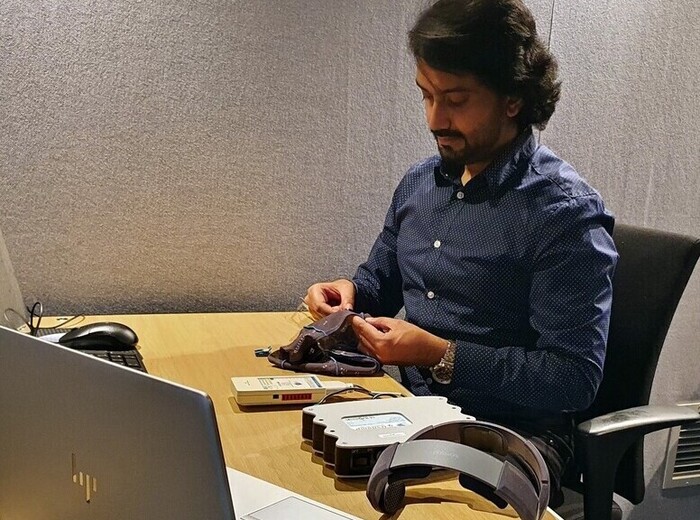For the next four years, Postdoc Muhammad Ahmed Khan will be developing a novel and portable home-based stroke rehabilitation system using Brain-Computer Interface technology.
Dr. Khan has been awarded a grant from the Novo Nordisk Foundation, which will allow him to perform the research activities as a Visiting Postdoc Fellow at the Stanford Bio-X Institute. For the first three years of the four-year project, he will be based at the prestigious Stanford University, followed by a year at DTU, where he will finalise the work.
“My vision is to advance rehabilitation innovation. In addition to providing rehabilitation treatment, the system will provide an opportunity to improve rehabilitation training programs, hence leading to enhanced clinical treatment and health outcomes. I want to introduce a new paradigm of advanced stroke rehabilitation”, Muhammad Ahmed Khan says.
Better treatment outcome with brain signals
"The purpose of rehabilitation is not only regaining the lost physical functions. It is more about making the patient feel comfortable and relaxed along with their treatment."
Dr. Muhammad Ahmed Khan
A stroke is a life-changing event that can affect the patient’s emotional state as much as their physical functions. Among the stroke survivors, around 50% suffer from upper limb paresis, i.e. weakness or inability to move the upper limbs. These patients still have some control of their weakened muscles. Patients with paralysis have no control at all of the affected muscles. They are unable to get signals from their motor cortex (the part of the brain that controls movement) to their muscles.
To restore their movements, the use of functional electrical stimulation (FES) is among the effective rehabilitation methods. In conventional therapy, the therapist delivers the FES manually, thereby, limiting the active participation of the patient’s brain.
By contrast, motor imagery based brain-computer interface (BCI) systems use patient’s brain signals to control the task execution during the rehabilitation, which allows for a very effective training and promotes the recovery of the brain networks. However, the current BCI based stroke rehabilitation systems are available only for clinical settings, and no existing system is completely portable and wireless.

Photo: Postdoc Muhammad Ahmed Khan works on an experimental setup for EEG acquisition. (Photo by Cihan Uyanik)
Stroke rehabilitation at home
In the SmartRehab project, a pilot study for developing a novel rehabilitation system for upper limb rehabilitation has been presented that will merge the ‘BCI technology’ with ‘Home-Based Stroke Rehabilitation’ for the first time. The developed system will be supported by a motor imagery EEG (electroencephalography) based BCI system, virtual reality, and FES, which will be completely wireless, portable, user-friendly, and easy to use at home.
“The purpose of rehabilitation is not only regaining the lost physical functions. It is more about making the patient feel comfortable and relaxed along with their treatment. In the coming future, the clinical visits for stroke rehabilitation will become history. The restoration of brain-muscle connections at the patient’s own home via advanced brain-computer interface (BCI) technology is on its way”, Muhammad Ahmed Khan finishes.
(Top photo by Jesper Scheel)
Project Title: SmartRehab: Design and Development of Brain-Controlled Smart and Portable Rehabilitation Kit for Home-Based Stroke Recovery
Funding: 4 MDKK
Funding Program: “Visiting Scholar Fellowship at Stanford Bio-X” by “Novo Nordisk Foundation”
Partners: The SmartRehab is highly interdisciplinary and involves the following mentors from the partner institutes:
- Prof. Kimford Jay Meador (Primary Mentor: Department of Neurology and Neurological Sciences, Bio-X Institute, Stanford University, USA)
- Prof. Ada Poon (Co-mentor: Department of Electrical Engineering, Bio-X Institute, Stanford University, USA)
- Prof. Maarten G Lansberg (Co-mentor: Department of Neurology and Neurological Sciences, Bio-X Institute, Stanford University, USA)
- Assoc. Prof. Sadasivan Puthusserypady (Danish Host: Digital Health Section, Health Technology Department, Technical University of Denmark, Denmark)
- Assoc. Prof. Iris Brunner (Collaborator: Regionshospital Hammel Neurocenter, Aarhus University, Denmark)